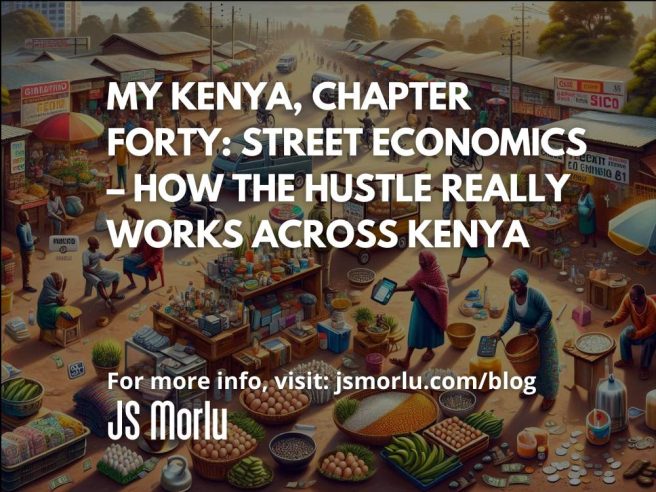By: John S. Morlu II, CPA
🚶♀️ Walking Entrepreneurs: In Kenya, people don’t just walk — they walk with purpose. You’ll find someone pacing up and down traffic with socks, books, snacks, and even perfume testers. One guy sold wristwatches in traffic and now runs a watch shop called ‘Traffic Time.’ True story.
🧃 Juice Sellers with MBAs: That fresh mango juice you’re sipping on in downtown Nairobi? Might’ve been blended by a finance graduate who figured margins are sweeter on juice than spreadsheets. The ROI is in the pulp.
🔧 Mobile Repair Kings: Dropped your phone? No worries. There’s a street repair guy with a toolkit that looks like it came from NASA — but fits in a pencil case. He’ll fix your phone in 5 minutes while updating you on the latest Premier League scores.
🪒 The Sidewalk Barbershop: Yes, you can get a fade under a tree. These roadside barbers operate with a cape, a mirror nailed to a tree, a battery-powered trimmer, and the swagger of a salon in Beverly Hills.
🍛 Chapati Economics: One chapati goes for Ksh 20. You might laugh, but the margins are so good that some roadside chapati vendors earn more daily than salaried employees — and they go home with cash, not spreadsheets.
📊 Street Data Analysts: Don’t sleep on street vendors. They know which corners work, which products sell better when it rains, and what color attracts the most buyers. It’s not Excel, but it’s real-life analytics in action.
👗 Boutique-in-a-Bag: Ever seen someone carry their entire business in a duffel bag? Pop it open — dresses, shoes, earrings, cologne. It’s a moving mall on two legs. And they’ll give you a discount if you say ‘I saw you last week!’
📢 Street Slogans: Ever heard, ‘Buy one, smile for free!’ or ‘Original fake shoes from Dubai!’? Kenyan marketing deserves a Netflix documentary. It’s honest-ish and unforgettable.
🔥 Bottom Line: Kenyans don’t just survive — they improvise, monetize, and optimize. If business schools studied the street economy here, they’d rewrite the textbooks.
If you really want to understand Kenya, don’t look at the GDP or World Bank reports. Hit the streets — where the real economy hums like a boda boda engine on Monday morning.
💰 Street Hustle Capitalism: Every corner of Kenya, from Nairobi to Eldoret to Mombasa, runs on hustle. Hawkers don’t wait for permission — they set up shop wherever there’s a breeze and a crowd. Selling socks, boiled eggs, power banks, or bananas, they’ve mastered supply and demand without ever reading Adam Smith.
🍳 Breakfast Economics: The ‘chai and mandazi’ combo is an industry. For Ksh 30–50 ($0.20–$0.40), you’ve got breakfast and startup fuel. Tea ladies know exactly how many customers want light sugar, heavy milk, or spicy ginger. Data analytics? It’s all in her memory.
🚗 Mobile Businesses: Your Uber driver sells peanuts. Your boda guy is a DJ. Your plumber is studying law part-time. In Kenya, every profession has a profession. Even your doctor might run a small kiosk on weekends.
🛍️ The Market Mentality: Open-air markets (like Gikomba or Toi) are not just where clothes get sold — it’s where negotiation is sport. The rule? If you pay the first price, you’re a tourist or in love. Maybe both.
📦 Side Hustle Nation: Everyone is selling something. Cosmetics, secondhand shoes, online courses, life coaching. One lady in Kisumu runs a tailoring shop, hosts a YouTube channel, and does crypto at night. Kenyan energy is unmatched.
📱 Mobile Money Mindset: With M-PESA and Airtel Money, cash is digital. Street vendors accept mobile payments. Some even prefer it — easier to save, harder to get robbed. One chapatti vendor even accepts crypto. Innovation meets ugali.
🪑 Chair Rentals, Anyone?: In some towns, you can rent a plastic chair for Ksh 10. Event planners, politicians, and even churches use this model. It’s the Airbnb of the streets. Bring your own sitting fees.
🦅 Resilience Market: Drought? Fuel hikes? Inflation? Kenyans still hustle. One guy built a chicken coop on his rooftop and sells eggs via WhatsApp. Another delivers vegetables via boda like Uber Eats meets grandma’s garden.
⚖️ Economic Insight: There’s no such thing as a small economy in Kenya — only a small ego. Everyone plays a role. The kid polishing shoes at Kencom may fund his school fees. The woman selling roasted maize may be supporting a family of six.
🧠 Business Tip: If your product doesn’t survive the street test — real people, real prices, real feedback — you’ve got work to do. Kenya’s streets are the world’s most brutal business incubator.
This is Kenya — a place where the formal and informal dance together daily. The hustle is loud, proud, and practical. It’s capitalism with character, commerce with charm, and street smarts sharper than your average MBA.
About the Author
John is an entrepreneur, strategist, and founder of JS Morlu, LLC, a Virginia based CPA firm with multiple software ventures including www.FinovatePro.com, www.Recksoft.com and www.Fixaars.com . With operations spanning multiple countries, John is on a mission to build global infrastructure that empowers small businesses, entrepreneurs, and professionals to thrive in an increasingly competitive world. He believes in hard truths, smart execution, and the relentless pursuit of excellence. When he’s not writing or building, he’s challenging someone to a productivity contest—or inventing software that automates it.
JS Morlu LLC is a top-tier accounting firm based in Woodbridge, Virginia, with a team of highly experienced and qualified CPAs and business advisors. We are dedicated to providing comprehensive accounting, tax, and business advisory services to clients throughout the Washington, D.C. Metro Area and the surrounding regions. With over a decade of experience, we have cultivated a deep understanding of our clients’ needs and aspirations. We recognize that our clients seek more than just value-added accounting services; they seek a trusted partner who can guide them towards achieving their business goals and personal financial well-being.
Talk to us || What our clients says about us




